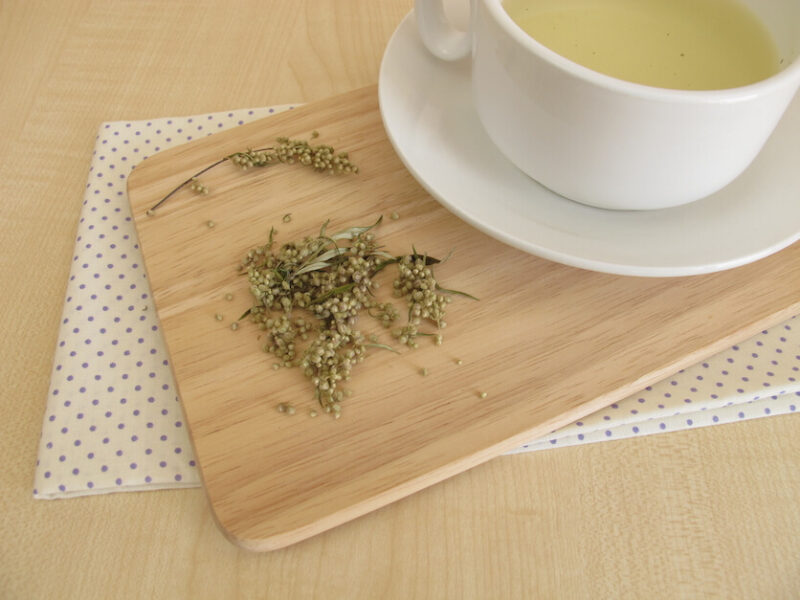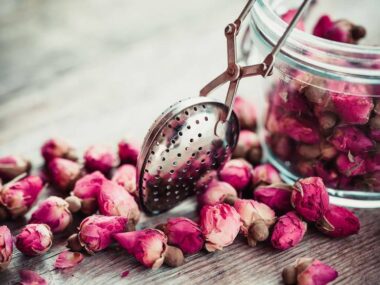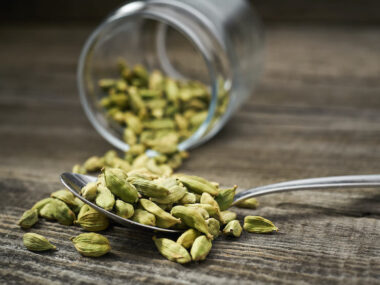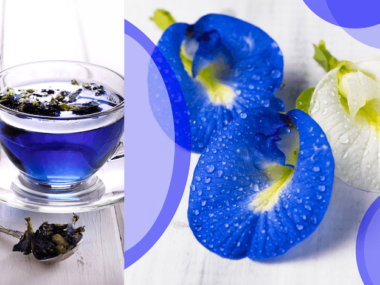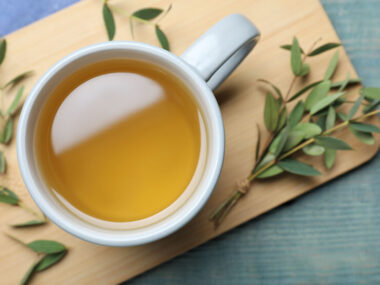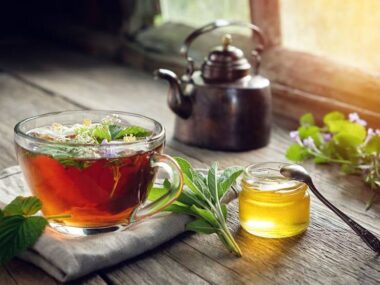How did a raggedy weed that gardeners vigorously fight find its way into a teacup? If you are an avid herbal tea drinker, you will want to read this. Mugwort tea has a hidden “mugshot” most don’t even know about.
Table of Contents
What Is Mugwort Tea?
Mugwort tea is an infusion made from Artemisia vulgaris (common mugwort.) The leaves of this plant are dried, packaged, and sold as loose-leaf tea.
Traditional, folk, Chinese, and Ayurvedic medicines use this tea to treat various ailments and conditions. Tea such as mugwort is a tisane (herbal tea) and not a true tea (such as black, green, oolong, yellow, or white.)
What Is Mugwort?
Mugwort is one of many species of herbaceous, weedy plants belonging to the Asteraceae family (which includes sunflowers.) Mugwort tea is made from common mugwort (Artemisia vulgaris.)
This plant is native to Europe and Asia, but it also grows wild in other parts of the world. Mugwort is the disdain of many gardeners and plant nurseries because of its intense invasiveness. The U.S. has it listed as not only an invasive species but noxious (classified as toxic or poisonous.)
Uses Of Mugwort
Humans have used this plant for centuries for medicinal purposes, cooking, and more. Although the plant leaves are considered edible, there are warnings against overconsumption.
Various food, cosmetic, and herbal industries cultivate mugwort to produce teas, supplements, tinctures, lotions, and even a spice in culinary applications. Asia utilizes mugwort for its pungent aroma and bitter taste to season meats, salads, alcoholic drinks, rice cakes, and other consumables.
Mugwort is best known for its unconventional medicinal use in Asia and Europe. Everything from gastrointestinal and gynecological diseases, pain, inflammation, and everyday ailments are treated with mugwort. One of the most popular forms with the use of this plant is making an infusion (brew) by boiling dried leaves. Another is through the practice of moxibustion.
History Of Mugwort
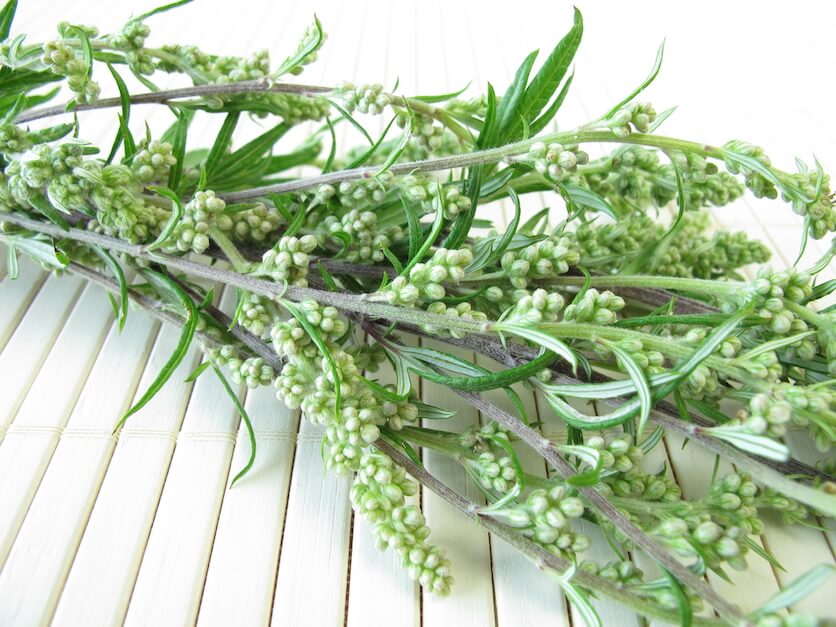
Claims of just how mugwort (Artemisia vulgaris) got its name is believed to have come from Artemis (the Greek goddess of childbirth.) The goddess’ name is interlinked with mugwort’s use in traditional medicine for numerous gynecological conditions. In medieval times, Artemisia vulgaris was known as “mater herbarum” (mother of herbs.) This plant’s prominent use continued through the Renaissance period into the modern day. Various research studies have aroused whether or not the use of this plant is safe or not. Ongoing research continues to closely look at how it benefits humans.
What Does Mugwort Tea Taste Like?
There is a distinct bitter bite to this tea. Numerous suggestions by others who have had this tea recommend adding a bit of honey to make it more palatable. When making this tea, it’s best to follow the directions on the packaging on the amount to use. If more than the recommended amount is used to brew a tea, it causes an overwhelming pungent aroma and unpleasant flavor.
Is There Caffeine In Mugwort Tea?
Herbal teas (tisanes) such as mugwort do not contain caffeine. Tisanes are not a true tea because they are made from parts of various plants such as leaves, flowers, stems, or roots. True teas such as black, green, oolong, white, and yellow are caffeinated because they come from the only naturally caffeinated plant known as Camellia sinensis. To avoid caffeine, many tea drinkers opt to enjoy tisanes instead.
Does Mugwort Make You Sleepy?
There are widespread mentions in various research studies (such as “Significance of Artemisia Vulgaris L. (Common Mugwort) in the History of Medicine and Its Possible Contemporary Applications Substantiated by Phytochemical and Pharmacological Studies”) how common mugwort (Artemisia vulgaris) plays a role in traditional medicine in treating insomnia. So yes, it might help you fall asleep easier.
Is It Okay To Drink Mugwort Tea Every Day?
We do not have the medical or professional expertise to provide recommendations or advice on the safety of consuming this tea daily. We do highly recommend that you consult with your healthcare provider before drinking any tea (true tea or tisane.) Some teas may cause adverse reactions, interact with certain medications, or cause side effects.
Why Is Mugwort Tea Bad For You?
Molecules 2020 published a research study (Significance of Artemisia Vulgaris L. (Common Mugwort) in the History of Medicine and Its Possible Contemporary Applications Substantiated by Phytochemical and Pharmacological Studies) which states mugwort may cause adverse allergic reactions such as anaphylactic shock, breathing difficulties, itchy skin, asthma, conjunctivitis, or rhinitis. The study goes on to mention mugwort may cause miscarriage, nausea, vomiting, and damage to the nervous system. They also state that the European Food Safety Authority (EFSA) regards certain ingredients in mugwort essential oil as causes of potential adverse effects in humans. Additionally, they caution those with diabetes when consuming or using mugwort because it causes blood glucose levels to go up.
Meyler’s Side Effects of Drugs 16th Edition mentions Artemisia vulgaris as potentially causing allergic skin reactions and “abortive activity” (miscarriage) because of “toxic lactone santonin.”
A 49-year-old man was admitted to a hospital in Zurich after consuming a liter of mugwort tea. He had a very high level of thujone (a toxin.) An investigational study (Identification and Quantification of Thujone in a Case of Poisoning Due to Repeated Ingestion of an Infusion of Artemisia Vulgaris L.: Thujone in Artemisia vulgaris poisoning) on possible thujone poisoning caused by mugwort tea was conducted. The results of this study have yet to be made accessible to the public.
North Carolina State Extension clearly states on their Artemisia vulgaris plant profile that this plant is poisonous if ingested in large amounts because of thujone (a toxin.)
The U.S. Food and Drug Administration (FDA) lists Artemisia species as “generally recognized as safe” but only if it does not contain thujone (a toxin.)
What Is Thujone?
Thujone is a naturally occurring volatile in aromatic plants (which includes mugwort, sage, rosemary, arborvitae, oregano, etc.) Essential oils are made from those volatiles. A comprehensive study (Thujone, a widely debated volatile compound: What do we know about it?) explains the bioactivity of thujone.
Mugwort (or any other thujone-producing plant) will differ in thujone levels because of several factors: region, budding stage, seed development stage, and developmental stage. Mugwort growing in Iran will have a different level of thujone compared to one growing in Europe.
Additionally, it is estimated that humans should not have more than 3-7 mg of thujone per day. However, that figure is difficult to obtain because of the variables regarding the origin of the plant. Additionally, purchasing mugwort tea from less than reputable sources leaves the buyer unaware of where the plant was grown, what budding stage it was harvested, and how developed the plant was.
What Does Mugwort Tea Do For You?
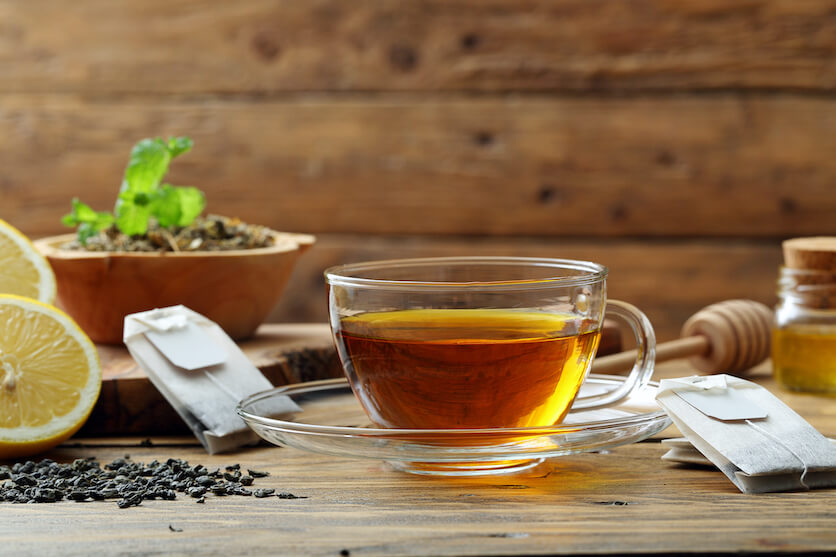
Those non-conventional medicines have relied for centuries on mugwort in treating a broad spectrum of health and medical conditions. Some of these beneficial mugwort tea effects helped inflammation, oxidative stress disease, gynecological issues, and so much more. A research article published (Research Advances on Health Effects of Edible Artemisia Species and Some Sesquiterpene Lactones Constituents) notes that certain compounds in mugwort exhibit high therapeutic and pharmacological potential.
Although non-conventional medicines claim mugwort tea benefits a host of ailments and conditions, there is inconclusive evidence-based data on clinical studies of mugwort and humans. Research studies indicate findings on how mugwort affected rats and mice.
Further scientific research is warranted to provide a better window into how mugwort benefits humans.
How To Make Mugwort Tea
We must caution readers that consuming mugwort tea may be unsafe based on the supporting information we have provided. If you do choose to try this tea, we have included a recipe on how to make it.
Mugwort Tea Recipe
Sourcing the tea from a reputable place is important. Tisanes with ambiguous ingredient lists or prepared and packaged the wrong way can be dangerous.
Ingredients
- Loose-leaf mugwort tea
- Water
- Honey (to sweeten if desired)
Directions
- Follow the directions on the packaging on the amount of tea to use.
- Bring the water to a boil.
- Place the loose-leaf tea into a tea infuser and drop it into the water.
- Cover and allow it to steep for 5 minutes.
- Remove the cover.
- Pour into a teacup.
- Add honey to sweeten (optional) and enjoy.
Alternative Mugwort Recipe
If you are searching for something a bit less risky to drink, we have a tea that is just as good.
Oregano Tea Recipe
Ingredients
- 2 cups of water
- 1 teaspoon of ground Greek oregano
- ⅛ teaspoon of black pepper
Directions
- Bring the water to a boil.
- Add oregano and pepper to hot water.
- Cover and allow to steep for 5 minutes.
- Remove the cover.
- Pour into a teacup and enjoy.
Learn more about oregano tea from our previous post.
A Cautious Decision
Before trying any tisane, it’s best to do your homework to find out if it causes side effects, interacts with your medications, or may cause adverse reactions for those with medical conditions. Don’t take the word of others as the gospel truth, especially when it comes to your health and possibly your life.
